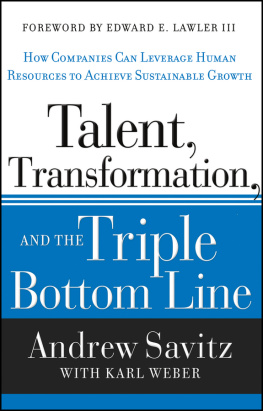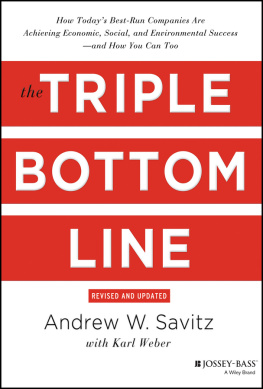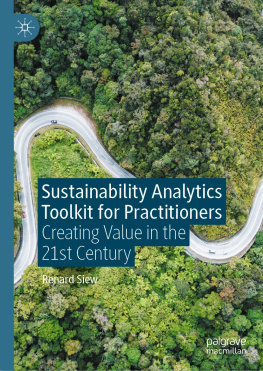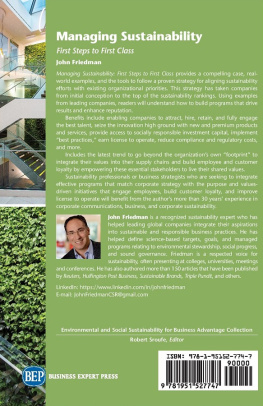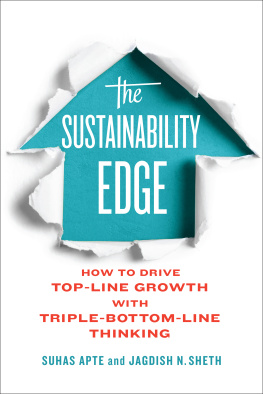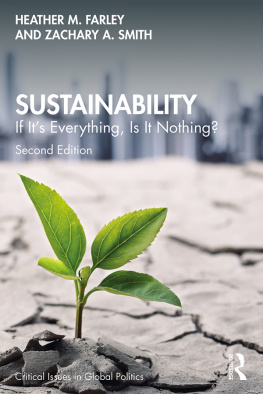
Cover design: Faceout Studios
Copyright 2013 by John Wiley & Sons, Inc. All rights reserved.
Published by Jossey-Bass
A Wiley Imprint
One Montgomery Street, Suite 1200, San Francisco, CA 94104-4594www.josseybass.com
No part of this publication may be reproduced, stored in a retrieval system, or transmitted in any form or by any means, electronic, mechanical, photocopying, recording, scanning, or otherwise, except as permitted under Section 107 or 108 of the 1976 United States Copyright Act, without either the prior written permission of the publisher, or authorization through payment of the appropriate per-copy fee to the Copyright Clearance Center, Inc., 222 Rosewood Drive, Danvers, MA 01923, 978-750-8400, fax 978-646-8600, or on the Web at www.copyright.com. Requests to the publisher for permission should be addressed to the Permissions Department, John Wiley & Sons, Inc., 111 River Street, Hoboken, NJ 07030, 201-748-6011, fax 201-748-6008, or online at www.wiley.com/go/permissions.
Limit of Liability/Disclaimer of Warranty: While the publisher and author have used their best efforts in preparing this book, they make no representations or warranties with respect to the accuracy or completeness of the contents of this book and specifically disclaim any implied warranties of merchantability or fitness for a particular purpose. No warranty may be created or extended by sales representatives or written sales materials. The advice and strategies contained herein may not be suitable for your situation. You should consult with a professional where appropriate. Neither the publisher nor author shall be liable for any loss of profit or any other commercial damages, including but not limited to special, incidental, consequential, or other damages. Readers should be aware that Internet Web sites offered as citations and/or sources for further information may have changed or disappeared between the time this was written and when it is read.
Jossey-Bass books and products are available through most bookstores. To contact Jossey-Bass directly call our Customer Care Department within the U.S. at 800-956-7739, outside the U.S. at 317-572-3986, or fax 317-572-4002.
Wiley publishes in a variety of print and electronic formats and by print-on-demand. Some material included with standard print versions of this book may not be included in e-books or in print-on-demand. If this book refers to media such as a CD or DVD that is not included in the version you purchased, you may download this material at http://booksupport.wiley.com. For more information about Wiley products, visit www.wiley.com.
Library of Congress Cataloging-in-Publication Data
Savitz, Andrew W.
Talent, transformation, and the triple bottom line: how companies can leverage human resources to achieve sustainable growth / Andrew W. Savitz with Karl Weber ; foreword by Edward E. Lawler, III. 1st ed.
p. cm.
Includes bibliographical references and index.
ISBN 978-1-118-14097-0 (cloth), ISBN 978-1-118-22549-3 (pdf) ISBN, 978-1-118-23890-5 (epub) ISBN, 978-1-118-26357-0 ( mobipocket)
1. ManagementEnvironmental aspects. 2. Personnel managementEnvironmental aspects. 3. Sustainable developmentManagement. 4. Social responsibility of business. I. Weber, Karl, 1953 II. Title.
HD30.255.S28 2013
658.4'083dc23
2012042029
This book is dedicated to my parents, Herb and Adel,
and to my brothers, Peter, Matt, and Jon.
Its for my familyPenny, Noah, Zuzzie, and Harryand for yours.
ABOUT THE AUTHORS
Andy Savitz is an internationally known expert on sustainability and was one of the lead partners in the Sustainability Services practice at PricewaterhouseCoopers, the global advisory services firm. He has worked with many companies to help them improve their financial, social, and environmental performance, and wrote The Triple Bottom Line (2006), one of the most successful and highly acclaimed books on sustainability. Andy worked extensively with the Society for Human Resource Management and with numerous companies and organizations in developing the guidance, strategies, and tools in this book, and to demonstrate why human resources is a critical and often underutilized asset to all organizations, small and large, that want to move toward sustainability. Andy now runs Sustainable Business Strategies (www.getsustainable.net), an independent consultancy based in the Boston area. He lives in Brookline, Massachusetts, with his wife and three children.
_________________
Karl Weber is a writer and editor specializing in business and current affairs. In addition to his collaboration with Andy Savitz on The Triple Bottom Line, Webers recent projects include the New York Times best seller Creating a World Without Poverty, coauthored with Muhammad Yunus, winner of the 2006 Nobel Peace Prize (2008), and its sequel, Building Social Business (2010); the New York Times number-one best seller What Happened: Inside the Bush White House and Washingtons Culture of Deception, by Scott McClellan (2008), which Weber edited; and two best-selling companion books to the acclaimed documentary films Food Inc. (2009) and Waiting for Superman (2010), both of which Weber edited. He has also collaborated with the noted consultant Adrian Slywotzky on several books, including Demand: Creating What People Love Before They Know They Want It (2011). Weber lives in Irvington, New York, with his wife, Mary-Jo Weber.
FOREWORD
HAVING SPENT MANY YEARS researching, teaching, and writing about the challenges facing contemporary business leaders, Ive become convinced that sustainability is one of the most crucial. To remain viable, organizations must find ways to foster social and environmental prosperity while creating economic prosperity. To paraphrase economist Jeffrey Sachs, they must transform themselves from wealth-creating organizations into commonwealth-creating organizationsa new requirement we might refer to as the sustainable effectiveness imperative .
Many factors have led to this imperative. Among the most important is the fact that both our natural environment and our social fabric are under enormous stress around the world. In the American Southwest, water scarcity is threatening the livelihood of the farmers who produce one-quarter of the food eaten in North America. In sub-Saharan Africa, poverty, famine, and HIV/AIDS are continuing to run rampant. In the fast-growing countries of Asia and South America, economic development is exerting enormous pressures on air and water quality.
For better or worse, for-profit companies and other organizations find themselves in the spotlight because of sustainability challenges. Some have helped create these problems as by-products of their business activities; most find themselves in a position to help address environmental and social problems. Many organizations are trying to understand the business risks and opportunities inherent in supporting sustainability. In any case, the perception is growing that businesses must play a role in solving the planets environmental and social problems.
This is why the Center for Effective Organizations has made sustainability research one of our top priorities. It is also why I focused on the concept of sustainable effectiveness in my most recent book, Management Reset , coauthored with Christopher G. Worley (Jossey-Bass, 2011). As Worley and I explain, sustainable effectiveness means creating the values, processes, capabilities, mind-set, and culture that are needed for organizations to succeed in the long term. We show how to create value, organize work, treat people, and guide behavior in ways that will enable growth, prosperity, and sustainability.
Next page
